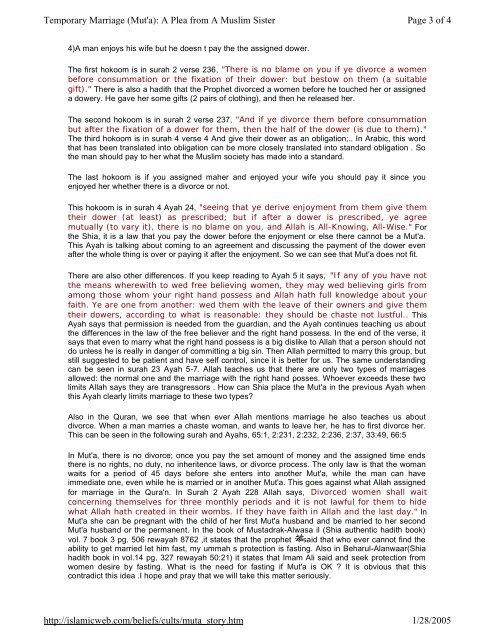Collection Of Articles (Refuting Shia) - Enjoy Islam
Collection Of Articles (Refuting Shia) - Enjoy Islam
Collection Of Articles (Refuting Shia) - Enjoy Islam
You also want an ePaper? Increase the reach of your titles
YUMPU automatically turns print PDFs into web optimized ePapers that Google loves.
Temporary Marriage (Mut'a): A Plea from A Muslim Sister<br />
Page 3 of 4<br />
4)A man enjoys his wife but he doesn t pay the the assigned dower.<br />
The first hokoom is in surah 2 verse 236, "There is no blame on you if ye divorce a women<br />
before consummation or the fixation of their dower: but bestow on them (a suitable<br />
gift)." There is also a hadith that the Prophet divorced a women before he touched her or assigned<br />
a dowery. He gave her some gifts (2 pairs of clothing), and then he released her.<br />
The second hokoom is in surah 2 verse 237, "And if ye divorce them before consummation<br />
but after the fixation of a dower for them, then the half of the dower (is due to them)."<br />
The third hokoom is in surah 4 verse 4 And give their dower as an obligation;.. In Arabic, this word<br />
that has been translated into obligation can be more closely translated into standard obligation . So<br />
the man should pay to her what the Muslim society has made into a standard.<br />
The last hokoom is if you assigned maher and enjoyed your wife you should pay it since you<br />
enjoyed her whether there is a divorce or not.<br />
This hokoom is in surah 4 Ayah 24, "seeing that ye derive enjoyment from them give them<br />
their dower (at least) as prescribed; but if after a dower is prescribed, ye agree<br />
mutually (to vary it), there is no blame on you, and Allah is All-Knowing, All-Wise." For<br />
the <strong>Shia</strong>, it is a law that you pay the dower before the enjoyment or else there cannot be a Mut'a.<br />
This Ayah is talking about coming to an agreement and discussing the payment of the dower even<br />
after the whole thing is over or paying it after the enjoyment. So we can see that Mut'a does not fit.<br />
There are also other differences. If you keep reading to Ayah 5 it says, "If any of you have not<br />
the means wherewith to wed free believing women, they may wed believing girls from<br />
among those whom your right hand possess and Allah hath full knowledge about your<br />
faith. Ye are one from another: wed them with the leave of their owners and give them<br />
their dowers, according to what is reasonable: they should be chaste not lustful.. This<br />
Ayah says that permission is needed from the guardian, and the Ayah continues teaching us about<br />
the differences in the law of the free believer and the right hand possess. In the end of the verse, it<br />
says that even to marry what the right hand possess is a big dislike to Allah that a person should not<br />
do unless he is really in danger of committing a big sin. Then Allah permitted to marry this group, but<br />
still suggested to be patient and have self control, since it is better for us. The same understanding<br />
can be seen in surah 23 Ayah 5-7. Allah teaches us that there are only two types of marriages<br />
allowed: the normal one and the marriage with the right hand posses. Whoever exceeds these two<br />
limits Allah says they are transgressors . How can <strong>Shia</strong> place the Mut'a in the previous Ayah when<br />
this Ayah clearly limits marriage to these two types<br />
Also in the Quran, we see that when ever Allah mentions marriage he also teaches us about<br />
divorce. When a man marries a chaste woman, and wants to leave her, he has to first divorce her.<br />
This can be seen in the following surah and Ayahs, 65:1, 2:231, 2:232, 2:236, 2:37, 33:49, 66:5<br />
In Mut'a, there is no divorce; once you pay the set amount of money and the assigned time ends<br />
there is no rights, no duty, no inheritence laws, or divorce process. The only law is that the woman<br />
waits for a period of 45 days before she enters into another Mut'a, while the man can have<br />
immediate one, even while he is married or in another Mut'a. This goes against what Allah assigned<br />
for marriage in the Qura'n. In Surah 2 Ayah 228 Allah says, Divorced women shall wait<br />
concerning themselves for three monthly periods and it is not lawful for them to hide<br />
what Allah hath created in their wombs. If they have faith in Allah and the last day." In<br />
Mut'a she can be pregnant with the child of her first Mut'a husband and be married to her second<br />
Mut'a husband or the permanent. In the book of Mustadrak-Alwasa il (<strong>Shia</strong> authentic hadith book)<br />
vol. 7 book 3 pg. 506 rewayah 8762 ,it states that the prophet said that who ever cannot find the<br />
ability to get married let him fast, my ummah s protection is fasting. Also in Beharul-Alanwaar(<strong>Shia</strong><br />
hadith book in vol.14 pg. 327 rewayah 50:21) it states that Imam Ali said and seek protection from<br />
women desire by fasting. What is the need for fasting if Mut'a is OK It is obvious that this<br />
contradict this idea .I hope and pray that we will take this matter seriously.<br />
http://islamicweb.com/beliefs/cults/muta_story.htm<br />
1/28/2005
















